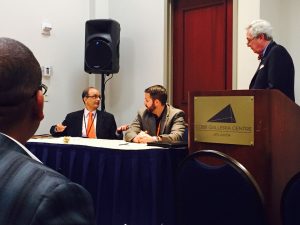
A new addition to the Atlanta Jewelry Show this spring was an expanded pre-show education program.
One of the more engaging sessions was the Diamond Power Panel, where unique perspectives were represented on the panel by Matthew Patton, Owner of Cut Fine Jewelers and Cecilia Gardener, Esq., President, CEO of JVC, Stanley Zale, VP Diamonds & Gemstones at Stuller and Prakash Lakhi, President of Vishinda Inc.
Subjects covered during the discussion ranged from the current and future economics and legality surrounding the increase of lab-grown diamonds and conversations about which certification processes offer the best assurance. There were differing opinions on whether retailers should promote and sell lab grown diamonds. Patton stated that he doesn’t sell lab grown diamonds because he can’t confidently tell his customers that lab grown diamonds will hold their value 1, 5 or 10 years from now.
On the other hand Zale stated that Stuller decided to sell lab grown diamonds in order to offer their customers another option. They will sell jewelry with whatever stone the customer wants, be it a sapphire, moissanite, or lab grown diamond. Asked his opinion, Lakhi stated that as a group, the Lakhi Group has decided not to venture into lab grown diamonds because “we do not want to confuse the customer.” He believes that if a manufacturer and wholesaler starts to offer lab grown diamonds for sale alongside natural diamonds, that it can cause confusion and raise trust issues among their customers. Gardener stated that while she doesn’t necessarily understand why a consumer would buy a manmade diamond for an engagement ring, that it is okay for a retailer to do so as long as they properly advertise and disclose a lab grown diamond as such, so that it is not confused with a natural diamond.
One point of concern for everyone on the panel was that no one knows where the value of lab grown diamonds will be down the road. Gardener also expressed her belief that she doesn’t think man made diamonds will hold their value over time. Patton stated that while he doesn’t advertise diamonds as an investment or a store of value, it is still important to his customers that they know what their diamonds will be worth years after his purchase. He said he sees only a 10% difference in price between manmade and natural diamonds, which isn’t compelling enough for his customers, especially since they can be reasonably assured that natural diamonds will hold their value well over time, while they can’t say the same for lab grown diamonds.
 Lakhi made a few important points. Firstly he said Moore’s law applies to lab grown diamonds too. Gordon Moore the co-founder of Intel stated that computing power doubles every two years and cost gets lower too, at an exponential pace. So lab grown diamonds will continue to go down in prices rapidly. Secondly he expressed his belief that manmade diamonds are a small percent of total diamond production, representing only less than 2% of the total diamond production today. But if it grows to about 5% within the next 5 years and 10% soon after, due to which diamond demand will have to increase to meet the new production. Fortunately, enough demand growth in China and India is resuming again and with no sizable natural rough diamond production in sight our industry seems to be secure. In response to a question from the audience, Lakhi stated that he won’t be surprised if in future lab grown diamond jewelry in stores will cater to a different kind of consumer-demand at lower price points akin to Pandora jewelry.
Lakhi made a few important points. Firstly he said Moore’s law applies to lab grown diamonds too. Gordon Moore the co-founder of Intel stated that computing power doubles every two years and cost gets lower too, at an exponential pace. So lab grown diamonds will continue to go down in prices rapidly. Secondly he expressed his belief that manmade diamonds are a small percent of total diamond production, representing only less than 2% of the total diamond production today. But if it grows to about 5% within the next 5 years and 10% soon after, due to which diamond demand will have to increase to meet the new production. Fortunately, enough demand growth in China and India is resuming again and with no sizable natural rough diamond production in sight our industry seems to be secure. In response to a question from the audience, Lakhi stated that he won’t be surprised if in future lab grown diamond jewelry in stores will cater to a different kind of consumer-demand at lower price points akin to Pandora jewelry.
The panel also discussed the recent EGL lawsuits that occurred, and the subsequent bad press that those labs received. Many stated their belief that the scandals have blown over now, and that consumers aren’t that concerned about those at this time, although they do request GIA grading reports for larger diamonds. Gardener stated her belief that regardless of what a lab report says, that a retailer should take responsibility for accurately stating their belief about the grade of a diamond that they are selling, and that they can’t expect to just hide behind what the grading report says.
At the close of the panel, each panel member was asked to make closing remarks. Zale closed by saying that he is “very bullish on diamonds”, and that he believes that natural diamonds will continue to be highly valued and coveted items for jewelry. Chandler closed by reiterating her belief that retailers need to be vigilant about doing their own QC because if anything is wrong with the jewelry they sell, or if it contains any synthetic jewelry, then they will be ultimately responsible for this. Chandler closed by stating that he believes that the trend of retailers closing their doors will continue. He believes that the problem is that retailers continue to try to compete directly with the internet, instead of presenting the value of what they are offering, and working to differentiate themselves from online retailers.
Lakhi closed the conference with two quotes. He said “I’ve learned that to ignore the facts does not change the facts,” and “Any man who knows all the answers most likely misunderstood the questions.” These quotes got an applause and a laugh from the crowd. His point was understood that the future is unknown at this time, but that as members of the industry we can’t ignore the emergence of threats to the industry. Rather than being ignorant to outside forces such as lab grown diamonds and inaccurate grading reports, that we need to come together and fight these issues as one and continue to adapt our business models and marketing accordingly.
To continue this conversation, we invite you to ask Lakhi questions you have about the diamond industry and the emerging threats. Please email diamonds@vishinda.com with your questions.
